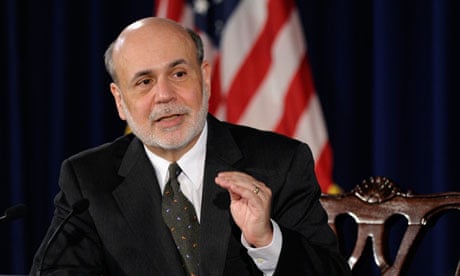The US Federal Reserve has signalled that it will end its massive stimulus programme next year amid further signs of a split in the central bank's committee.
Ben Bernanke, the chairman of the Fed, said that if forecasts for the country's economic recovery are correct the bank could end its asset purchase scheme next summer, with the winding-down process due to start this year.
Bernanke said the asset purchases would continue at their current rate until unemployment fell to about 7%, the first time that the Fed has specified an economic objective for the bond-buying. The unemployment rate stood at 7.6% in May.
In an effort to assuage investors' concerns over the consequences for the world's largest economy, Bernanke likened the move to "letting up the bit on the gas pedal as the car picks up speed, [and] not pressing on the brake."
Bernanke's recent suggestion that the Fed could taper off its huge bond-buying programme, known as quantitative easing (QE), shook investors, and US stock markets fell sharply again as Bernanke gave further details about the possible winding down of the scheme at a press conference on Wednesday.
The fall came even as the Fed concluded that the possibility that the America's economic recovery would slip into reverse, taking the jobs market with it, had "diminished since the fall."
In a statement released after a two-day meeting, the Fed said: "Labor market conditions have shown further improvement in recent months, on balance, but the unemployment rate remains elevated. Household spending and business fixed investment advanced, and the housing sector has strengthened further, but fiscal policy is restraining economic growth."
Against this backdrop, the Fed said it would continue to pump $85bn per month into the economy for now, buying $40bn of mortgage-backed securities and $45bn in Treasury bonds in an attempt to keep interest
rates at rock-bottom levels and to encourage investment.
The Fed chairman was at pains to stress that there was no imminent intention to change QE or raise rates. "It's important not to say: this date, that date, this time," Bernanke said. Any decision would be "economic dependent".
However, two members of the FOMC signaled in the latest statement that they had doubts about the Fed's handling of QE. James Bullard, president of the Federal Reserve Bank of St Louis, said the committee should "signal more strongly its willingness to defend its inflation goal in light of recent low inflation readings".
Long-time QE critic Esther George, president of the Federal Reserve Bank of Kansas City, again voiced her concern that the policy "increased the risks of future economic and financial imbalances."
Jack Ablin, chief investment officer at BMO Private bank, said the mixed messages were likely to continue as the Fed wants to keep up its stimulus program while warning that it will not last forever. "We believe Bernanke would like to keep the pedal to the floor with stimulus in an effort to spur as much growth and employment for as long as possible.
"At the same time, the Fed will continue to employ a Federal 'open mouth' policy to keep stocks and housing from rising too much further above fair value," he said in a note to investors.
At his regular press conference this afternoon, the Fed chairman refused to be drawn on his future plans following comments by the president earlier this week.
On Monday, Barack Obama said Bernanke has stayed in his job "longer than he wanted to or he was supposed to." In an interview with Charlie Rose on PBS the president said Bernanke, a 59-year-old former Princeton University professor, had been "an outstanding partner" in helping the US recover "from what could have been an economic crisis of epic proportions."
"I am not going to comment on my personal plans," said Bernanke. Bernanke was appointed chairman by president George W Bush in February 2006. His second four-year stint at the central bank officially ends January 31. While few expected him to seek, or get, a third term the comments were seen as a clearest signal yet that his time as Fed chairman is drawing to a close.

Comments (…)
Sign in or create your Guardian account to join the discussion